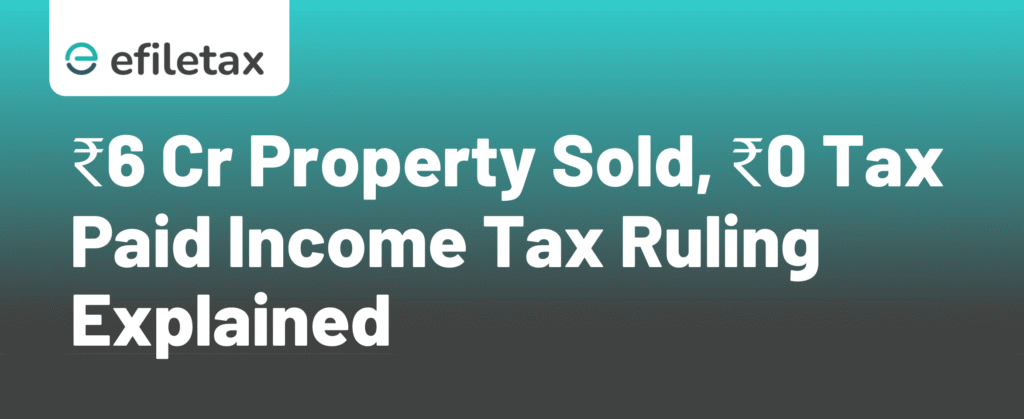
Can You Sell a ₹6 Cr Property and Pay Zero Tax?
A recent Income Tax Appellate Tribunal (ITAT) decision allowed an individual to sell a property worth ₹6 crore without paying a single rupee in capital gains tax. This ruling offers vital insights into how tax exemption provisions work under Indian tax law—especially in property transactions.
Let’s break down how this happened, what legal provisions were applied, and what lessons taxpayers can draw.
Why No Capital Gains Tax Was Paid?
The ITAT Hyderabad Bench dealt with the case of Late Dr. N. Siva Sankara Rao (Legal heir: Dr. S. Mohana Vamsi) vs. ITO [(ITA No. 503/Hyd/2023)].
Facts of the Case
- Sale value: ₹6 crore
- Cost of acquisition: Inherited residential plot with no original purchase cost (acquired before 01.04.2001)
- Declared capital gains: ₹0 after claiming Section 54F exemption
- AO’s stand: Disallowed Section 54F, demanded tax
- ITAT ruling: Favoured the taxpayer
Understanding Section 54F Exemption
Section 54F of the Income-tax Act, 1961 provides capital gains exemption when a taxpayer:
- Sells a long-term capital asset (not a residential house), and
- Invests the entire net sale consideration into purchasing or constructing one residential house in India within the specified time.
Time Limits
| Activity | Time Allowed |
|---|---|
| Purchase (before sale) | 1 year |
| Purchase (after sale) | 2 years |
| Construction | 3 years from sale |
Conditions to Claim 54F
- Must not own more than one house (other than the new one) on the date of sale
- Should not purchase another house within 2 years or construct one within 3 years
- Entire sale proceeds must be reinvested (else partial exemption allowed)
How the Tribunal Interpreted the Case
The AO denied the exemption saying:
- The new house purchased was not in the taxpayer’s name
- Claimed mismatch in investment timeline
But ITAT ruled that:
- The investment was made from the sale consideration
- Substance over form: The house was bought in the name of the taxpayer’s son but using the assessee’s funds
- Hence, benefit of Section 54F still applies
Key Takeaways from This Income Tax Ruling
Ownership in legal name is not always mandatory—beneficial ownership and actual use of funds matter.
Taxpayer rights upheld—the ruling reaffirms that genuine investments for residential use shouldn’t be denied exemption due to technicalities.
Plan your transactions—ensure funds are traced clearly to avoid disputes.
Expert Tip: Use Capital Gains Account Scheme (CGAS)
If you’re unable to invest before filing ITR, deposit the sale proceeds in a CGAS account. This keeps your Section 54/54F exemption claim intact and helps you avoid litigation.
What This Means for You
- Selling ancestral land or old plots? You could pay zero tax if you follow Section 54F rules.
- Buying a house post-sale? Invest within 2 years and retain all records.
- Not ready to reinvest? Park funds in CGAS before filing returns.
Practical Steps to Save Capital Gains Tax
- Get a registered valuer’s report for FMV as on 01.04.2001 (for indexation)
- Use Section 54/54F smartly by reinvesting or using CGAS
- File ITR before the due date and declare exemptions accurately
- Maintain documentary proof of payments, bank transfers, CGAS deposit slips
FAQs
Q1. Can I invest in a house in my son’s name and claim Section 54F?
If you prove the investment was made by you, courts may allow it. But safest is to buy in your own name.
Q2. Can I still claim exemption if I invest after filing return?
Only if you deposited money in Capital Gains Account Scheme (CGAS) before ITR filing.
Q3. Can I reinvest in two houses?
No, Section 54F allows exemption for investment in only one residential house.
Final Word
The ITAT ruling shows that with correct planning and documentation, even a ₹6 crore property sale can be legally tax-free. But don’t rely on luck—ensure your transaction structure, investment proof, and compliance are airtight.
Need help with property capital gains planning?
Talk to experts at Efiletax — from valuation to exemption claims, we simplify your tax life.
Book a Free Consultation with Efiletax →
Summary
An ITAT ruling allowed a ₹6 crore property sale with zero capital gains tax using Section 54F exemption. Learn how to structure your property sale, invest in a new house, and avoid tax legally. Follow these tips and rules to stay compliant and tax-efficient.